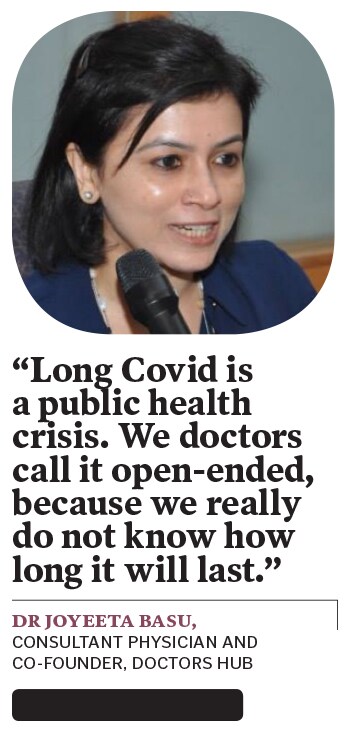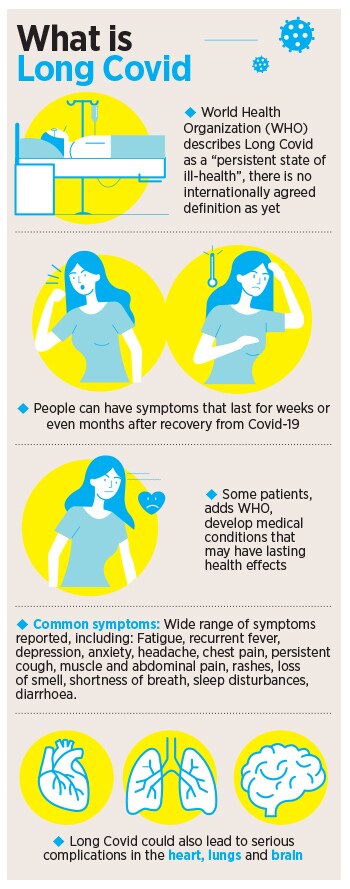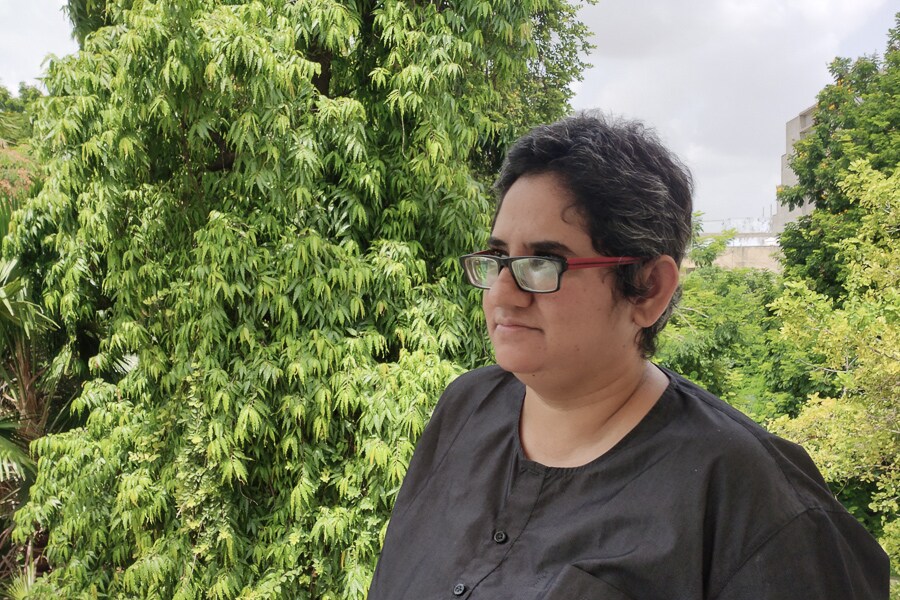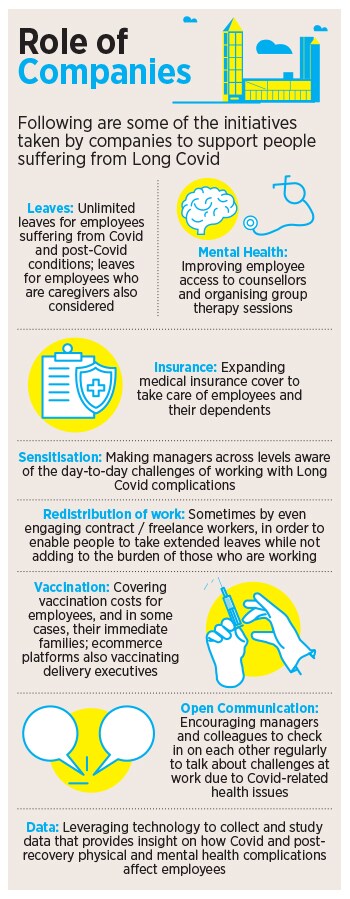![]()
Todi, who founded a bootstrapped ecommerce startup for handcrafted lifestyle and home decor products in 2018, had to shut it down as she could no longer manage it alongside work commitments. “It’s been over two months and I’m still able to work at just 50 percent efficiency," she says. Todi explains that while people at work were understanding during her recovery, she doesn"t know how to explain the fact that she still falls ill every other day. “Ultimately, the perception is that I am fine because I’ve tested negative, especially because others in the office have bounced back quickly post-Covid ," she says.
The World Health Organization (WHO), in a March update on the clinical long-term effects of Covid-19, describes Long Covid as a “persistent state of ill-health". It explains that while most people with Covid-19 recover and return to normal health, “some people can have symptoms that last for weeks or even months after recovery from acute illness… some patients develop medical complications that may have lasting health effects".
People are not infectious to others during this time and there is no internationally agreed definition of the condition as yet, the public health agency adds. Among the wide range of long-term symptoms reported, there is recurrent fever, depression, anxiety, headache, chest pain, persistent cough, muscle and abdominal pain, rashes, loss of smell, shortness of breath, diarrhoea and fatigue.
![]()
There is no saying how much time Long Covid symptoms will take to subside. “As doctors, we call it leaving something open-ended, because we really do not know how long it will last. I usually tell people three to six months, which is also a very long time," says Dr Joyeeta Basu, consultant physician.
According to her, cases of Long Covid have been more prevalent in the wake of the second wave. While 5 to 7 percent of her patients came back with Long Covid concerns after the first wave, the rate has tripled over the past few months. “This can be attributed to the [coronavirus] variants, which caused a more severe disease in many people this time around," she says, narrating a recent incident about how two of her patients in Gurugram who had recovered from Covid landed up in hospital for about 7-10 days after their oxygen levels suddenly dropped during a 5-km bike ride.
At its peak in May, India reported four lakh Covid-19 cases in a day. While infections have reduced to about 1/8th of those numbers in June [standing at 54,069 over 24 hours on June 24], people testing positive for Covid in India still contribute to about 22 percent of global cases, according to online scientific publication Our World In Data, which is the highest for any country.
“India is still battling the acute phases of Covid-19, wave after wave. This takes the attention away from Long Covid, which gets pushed behind and a lot of things about it remain unclear even today," says Dr Mandeep Garg, professor, department of radiodiagnosis and imaging at the Postgraduate Institute of Medical Education and Research (PGIMER) in Chandigarh. He is also a doctor managing Covid-19 patients and is the lead author of a research paper titled ‘The Conundrum of ‘Long-Covid-19’: A Narrative Review’, published in the International Journal of General Medicine in June.
![]()
Dr Basu, who is the co-founder of medical clinic Doctors Hub in Gurugram, has been seeing Long Covid playing out among her patients through complications in the heart, lungs, brains and mental health. “People are fearful and anxious that they might lose their jobs if they cannot go back to work or be productive enough soon," she says, adding that more young adults are showing Long Covid symptoms. “This is a public health crisis," she adds, explaining that over the next couple of months, she expects to see a rise in such cases. “For example, post-Diwali, when we have rising pollution levels, we’re going to see a lot of people with COPD [chronic obstructive pulmonary disease]. I dread the coming winter."
Spotlight on Young Workforce
In a press briefing on April 21, union health secretary Rajesh Bhushan said age groups 20-30 and 30-40 accounted for 19.35 percent and 21.15 percent respectively of total Covid cases in 2021. This is the highest among all age groups in the country. People aged 50-60 accounted for 15.07 percent, making it the third-most affected category. According to the Periodic Labour Force Participation Survey (PLFS, 2018-19), the 15-59 age group forms 63 percent of India’s total workforce of an estimated 47 crore people.
India has the second-highest Covid-19 caseload in the world, behind the US. Unlike the US, however, there is very little research or data available in India around Long Covid and how it is impacting people, be it through lowered productivity levels at work or daily life. In February, the US National Institute of Health (NIH) launched a major initiative to study the long-term effects of Covid-19, with a funding of $1.15 billion.
In India, the health ministry, Indian Council of Medical Research (ICMR) and the All India Institute of Medical Science (AIIMS) launched a National Clinical Registry of Covid-19 in September 2020 to track long-term symptoms. The Registry was supposed to collect and monitor real-time data of Covid-19 patients from 100 hospitals across the country. “Such data will serve as an invaluable tool for formulating appropriate patient management strategies, predicting disease severity, patient outcomes etc," read a letter from the ICMR dated August 6, 2020. Nine months on, this data has not been made public. Queries about the Registry sent by Forbes India to ICMR were unanswered at the time of writing this article.
When it comes to managing Long Covid on-ground, there continues to be awareness limitations among many members of the medical community, says Dr Garg.
![]()
Bhasha Mewar’s experience is an example. When the 37-year-old museum professional developed acute Covid symptoms back in early March 2020, she struggled to get a diagnosis. “Back then, nobody knew about Covid or how to manage it. It was terrifying," she says. Even today, she suffers from chronic fatigue syndrome, gastrointestinal issues, chest tightness [airways become inflamed] and breathlessness. “Even if I just talk over the phone with my friends for about an hour, I get completely exhausted and need to lie down," she says. Mewar struggles to find doctors who can manage her conditions properly. “Guidance from Long Covid support groups on social media, which predominantly have people from the US and UK, help me take care of myself," she says, adding that the communities she is part of have close to 300 Indians.
![]() After recovering from Covid, Bhasha Mewar, a museum professional, is forced to take frequent breaks at work because even a little extra exertion aggravates her symptoms
After recovering from Covid, Bhasha Mewar, a museum professional, is forced to take frequent breaks at work because even a little extra exertion aggravates her symptoms
The nature of Mewar"s job does not allow her to work remotely from home. So while her boss at the museum gave her a sabbatical between June 2020 and January, even after rejoining, Mewar has to take frequent breaks during the day at work, because even a little extra exertion aggravates her symptoms. “I’m scared of this becoming a permanent debility. I’ve been told to just rest, rest and rest. But I’m not able to do that because I need my job and must report to work," she says, adding that having a supportive boss and workplace becomes critical for long haulers.
![]()
In corporate circles, while Long Covid is definitely a conversation—from discussing health benefits like insurance to impact on overall work practices—it is not likely to be very detailed at this point, says Shanthi Naresh, careers business leader, Mercer India. “Productivity loss is a concern for organisations, and many companies are undecided about having a formal policy on extended employee recovery periods," she says.
Alpana Dutta, partner, people advisory services at EY India, agrees that business affordability is a reality and if a business cannot afford something, it can become a short-term measure, but not a policy. “So unless an organisation can afford being generous with medical coverage, leave policy, vaccination etc, it is very difficult," she says. “Many organisations have raised their hands and said, ‘This is all we can do. Beyond this, we empathise, but cannot support as an organisation’. Therefore, according to her, the loudest statements with respect to taking care of the health and safety of employees are made by either companies that are large with deep pockets, or have gained business on account of the pandemic.
One such large organisation that has a multitude of policies to tackle the long-term implications of Covid-19 among its 21,000 employees (including 12,000 blue-collar workers) and 3,00,000+ people in its extended ecosystem [like micro-entrepreneurs in its network], is FMCG major Hindustan Unilever (HUL).
“Extended absence from the workplace either because of an arduous recovery from Covid-19 or caregiving responsibilities, and how that impacts productivity, has very much been on top of our mind," says Anuradha Razdan, executive director (human resources), HUL. The company supports its people through sick leave policy and encourages them to resume work only when they feel completely fit. Apart from undertaking vaccination of employees and their families, HUL has increased the number of doctors and counsellors accessible to them, and has tie-ups with 214 hospitals across the country.
![]()
There’s a two-level business continuity plan that finds ways to cover for people’s tasks even if they fall sick, redeployment of talent when understaffed, and sensitisation of leaders and managers across levels, Razdan says. She adds that investment in medical infrastructure and employee welfare, while ensuring availability of sufficient manpower at all times is the route to long-term resilience.
“Compassion does not need to come at the cost of business," she says. “If we have prioritisation of health and safety, agile ways of working and redeployment of talent as per requirement, you can be compassionate without compromising on the commercial aspects of the business."
![]()
Consistent and long-term mental health support is one of the biggest priorities for employees during this time, says SV Nathan, partner and chief talent officer, Deloitte India. He explains that apart from Covid-related policies like insurance cover for employees and their dependents, unlimited leaves, and redistribution of workload to ensure people can take their time to rejoin work and those working are not overburdened by the long-term absence of their colleagues, the consultancy firm has started counselling helplines for employees and their family members.
“All of our 65,000 employees and their families have access to this confidential counselling helpline, 24x7, on all 365 days. Compared to before the start of the second wave, we have witnessed a four-fold jump in calls," he says, adding that employees are also encouraged to reach out and check in on one another on a regular basis."
Awareness is paramount for empathy at the workplace, believes a senior sales associate at a data science startup in Bengaluru, who did not want to be identified. The 31-year-old has been suffering from brain fog, fatigue, blurry vision, nausea, and gastrointestinal issues since October 2020. “Companies understand when you are suffering and give you leeway to a certain extent, but if there are people on the team who are just not aware of what someone can go through because of Long Covid on a day-to-day basis, they can be quite unsupportive and insensitive about it," he says.
A senior media sales executive in Mumbai agrees that beyond a certain time, there is expectation from employees to perform like normal again. The executive, who did not want to be identified, was hospitalised twice: First, because of severe Covid in October, and then due to post-Covid symptoms in late December during which time he was completely immobile for a few days due to sharp pain in his body, among other symptoms.
He recounts how managers expected him to work as early as two-three days after both his hospitalisations, despite the severity of his case. He continues to experience frequent headaches, bouts of cough, sleep disorders, drop in energy levels, fatigue, and inability to concentrate and handle stress. “Things get overwhelming faster than they used to before," he says.
“My blood sugar is also on the higher side as a result of Covid. The doctor says if I do not manage a lifestyle, this could become a problem," he explains, adding that if there are no defined company policies about how employees with Long Covid must be treated, many lay people cannot understand the severity. “If I was discharged and out of the hospital, it was assumed I could be back at work. Nobody asked or checked about what symptoms I was facing," he says. “There needs to be a mechanism where the company is able to understand different cases in consultation with doctors and accordingly decide how much leeway needs to be given."
Due to lack of a standardised company policy, employees have to rely on empathy and sensitivity of individuals, he says. While from a work perspective he did not receive much support and was expected to be back almost immediately post hospitalisation, the executive realised that some others in the organisation suffered disparity even with respect to the extent of company support during Covid treatment. “While I got the support I needed during my hospitalisation, from arranging ambulances to cashless insurance, different departments or managers behave differently," he says.
Naresh of Mercer India says that given the emotional toll Covid takes on people, sensitisation of managers is forward-looking and necessary to ensure empathy on a day-to-day basis. Dutta of EY India agrees that managers need to develop skills to help stressed employees and deal with stress themselves. “It is important to study data around Long Covid in the organisation to design progressive wellbeing policies," she says, adding that companies cannot follow a one-size-fits-all approach, particularly with respect to Long Covid.
Companies like ecommerce firm Flipkart and hyperlocal delivery startup Dunzo say that they are putting in place personalised programmes to cater to specific physical and mental health requirements of employees.
Apart from Covid leaves, medical insurance, counselling support and vaccinations, Flipkart is placing an emphasis on regular, open conversations to address evolving needs of the employees, says Chief People Officer Krishna Raghavan. “We encourage regular communication between leaders and their teams, to understand their day-to-day experiences and address any apprehensions they might have," he says over email, adding that gathering insights and feedback almost on a real-time basis has helped the company implement initiatives that have had a positive impact on the lives of employees.
“Tech has enabled us to ensure that we’re able to meet growing demand, but it’s never at the cost of the health of a [delivery] partner, team member or merchant," says Geetanjali Swamy, head—people team at Dunzo. “Everyone’s reaction to Covid is different and keeping in touch with team members who are affected helps us solve their challenges. We are also evolving benefits on an everyday basis as per what people need," she says, in an email response, adding that the company is also providing sensitisation training, vaccinations, counselling and group therapy sessions.
Dr Garg of PGIMER stresses that awareness around Long Covid continues to be low among various stakeholders, which is why apart from corporate workplaces, it is important to continue disseminating information among medical professionals, patients, policy makers and the public.
According to him, health care facilities must be equipped to conduct regular follow-ups around the conditions of patients and study recovery patterns. Medical professionals could be more proactive and interactive with patients, particularly those who are not very literate or tech-savvy.
Dr Garg’s research article warrants setting up of dedicated, post-Covid care, multidisciplinary clinics, and rehabilitation centres. “Further research comprising cataloguing of symptoms, longer-ranging observational studies, and clinical trials are necessary to evaluate long-term consequences of Covid-19," it states. He adds that the government needs to prioritise a coordinated and systematic collection of data around Long Covid, which need to be made public. “This will help us create a more robust strategy, because Long Covid is going to be a huge challenge in times to come."

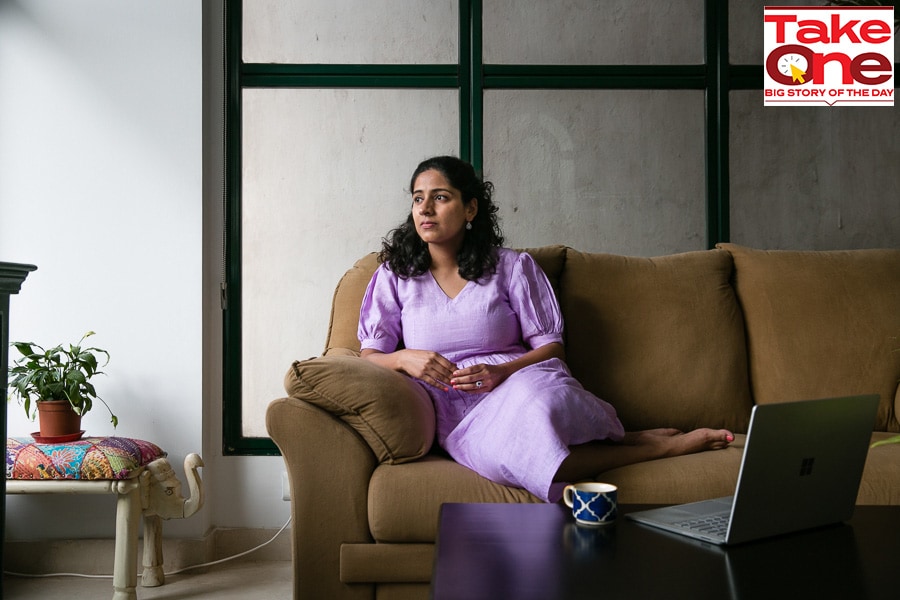 Megha Todi from Mumbai says contracting Covid was nothing compared to the after-effects that kept building on in her body and mind
Megha Todi from Mumbai says contracting Covid was nothing compared to the after-effects that kept building on in her body and mind 
